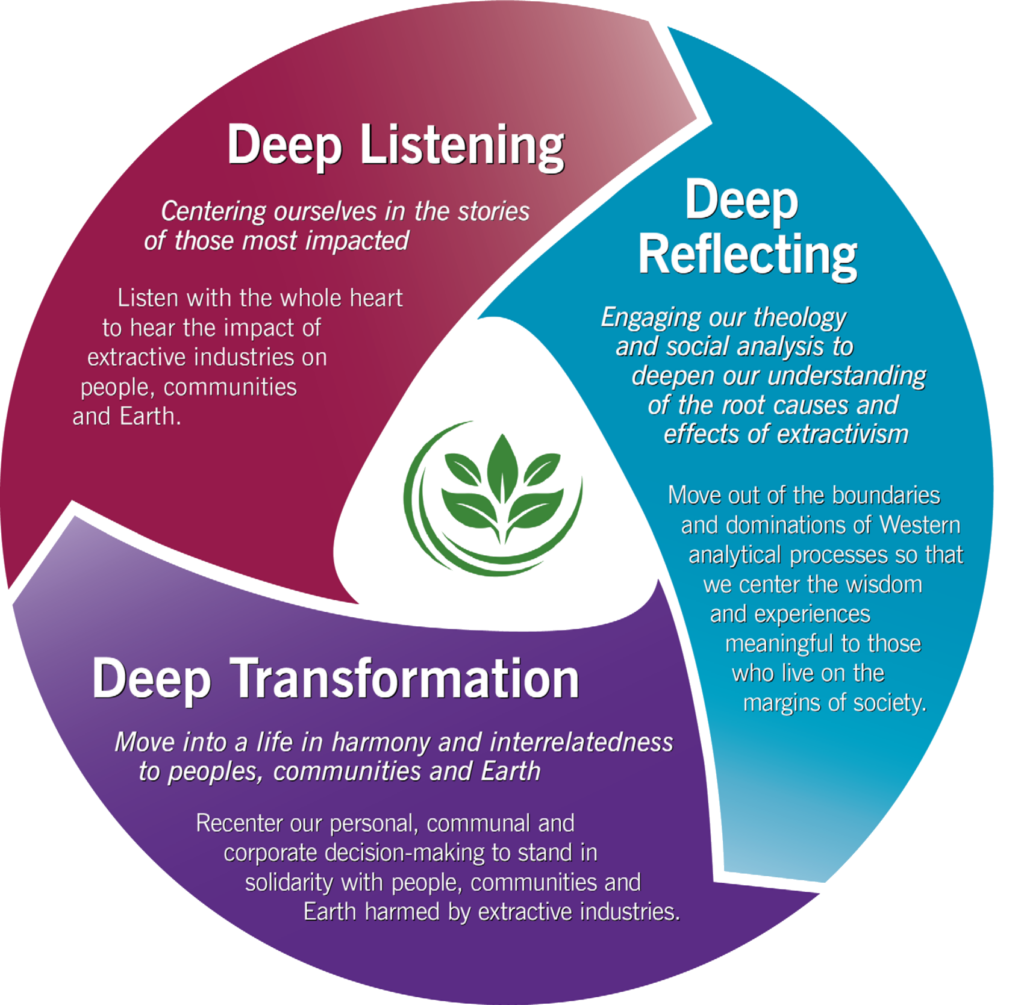Welcome to Awakening to a New Consciousness on Extractivism, a resource developed by the Sisters of Mercy of the Americas. This process will help participants delve deeply into the issues surrounding extractivism, including personal and societal complicity in the practices involved.
Extractivism is a destructive model of development that extracts minerals, metals, oils, gas and coal on a massive scale. We have come to understand it also extends to commercial over-fishing, deforestation for agricultural commodities and taking of land for tourism. In all its forms this model disrupts or destroys biodiversity, damages global ecosystems and devastates the health and well-being of local communities, while creating significant economic profits for the privileged few.
This material helps participants to:
- Deeply listen to the experiences of those most impacted by extractive industries;
- Deeply engage in theological reflection and social analysis;
- Prepare for deep transformation of individuals and communities;
- Take action on behalf of all creation.

Materials
Designed for use over six sessions, this process offers several ways for individuals and groups to engage in theological reflection.
- The 48-minute overview can be used as a stand-alone educational component or an extended introduction to the full process.
- Individuals can use the self-study materials, resources and reflection questions to explore the issue of extractivism at their own pace.
- The group process provides a facilitation guide for religious communities, parishes/congregations and other small groups to engage in education, reflection and discussion together.
Process Overview
The video provides a general overview of the issues connected to extractivism. The self-study and the group process provide the resources that you need to move through deep listening, deep reflecting and deep transformation on your own or with others. We strongly encourage you not to skip any of these steps since they build upon one another to challenge your thinking and lead you to more thoughtful responses.
Options
We invite you to choose how you want to access this rich compilation of resources: the video, the self-study or the group process. Select the one you want to use from the tiles displayed below.
-
Video Presentation
Use as a condensed version of the program or as an extended introduction.
Use as a condensed version of the program or as an extended introduction.
Explore
Explore -
Self-Study Guide
Designed for individual reflection, the self-study guide also serves as the participant guide for the group process.
Designed for individual reflection, the self-study guide also serves as the participant guide for the group process.
Explore
Explore -
Group Process
The group process includes facilitator guides for each session.
The group process includes facilitator guides for each session.
Explore
Explore
More Resources
When you have completed your choice of engagement, we invite you to check out the More Resources and Actions page for information on the most current issues related to extractivism and calls to action.
We hope you find these resources informative, challenging and inspirational. We’d love to hear what you have learned and any commitments to action that you have made. You may contact us at justice@sistersofmercy.org.
“We hear the call of our suffering world. The impoverishment of peoples, the devastation of Earth and oppressive social norms and systems call us at this moment to act … To intensify our efforts to align our investments with our values and, especially now, to pursue education and action against practices of extractive industries that are destroying people, communities and Earth.”
Sisters of Mercy of the Americas Chapter 2017 Recommitment Statement
Background
The Sisters of Mercy of the Americas, an international congregation of vowed women religious, launched the reflection process on extractivism in fall 2021. The process was one response to a 2017 Chapter (governing assembly) call “to intensify efforts to align our investments with our values and, especially now, to pursue education and action against practices of extractive industries that are destroying people, communities and Earth.” Sisters in Latin America and the Philippines particularly urged the congregation “to awaken to a new consciousness” as the result of their up-close experiences of the devastation wrought by extractivism.
More than 300 sisters, associates and staff participated in a five-session, five-month process of personal study and group reflection and conversation grounded in the realities of communities harmed by extractive industries.
At the conclusion of the process, we made a commitment to offer these resources to other congregations of women religious and to faith and secular partners. We adapted the content for a more general audience and then re-packaged the wealth of resources for self- and group- study. We also shared a recording of an online program that we presented to many within our community who were unable to participate in the longer process.